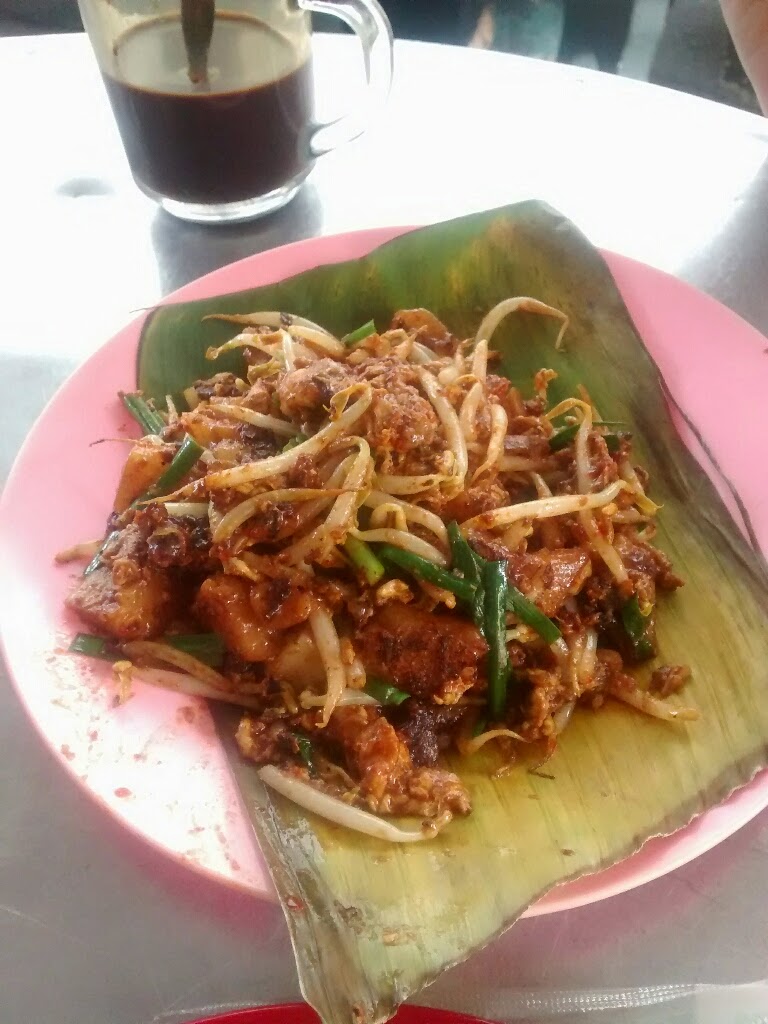We did just this today, ordering drinks and soup from the café, and two more dishes supplied by street vendors. We were introduced to two dishes whose names are confusing misnomers.
 |
| Chee cheong fun |
Chee cheong means pig intestine. Chee cheong fun is a slippery noodle dish named after its appearance and fortunately contains no offal. However, the Penang version does include a rather non-vegetarian black sweet sauce made with shrimp paste (which is similar to the rojak sauce). I must say that it wasn't my favourite dish in Penang.
Chai tow kway sounds very much like a spoonered version of char kway teow, which is very confusing, but not as a confusing as its English name. "Fried carrot cake?" My imagination conjured up images of slices of sponge crisping in a pan, the cream cheese icing melting into a sticky pool.
 |
| Chai tow kway |
The reality was (disappointingly) rather different. The dish contains no carrot (or raisins for that matter). Instead, it is made from a large white 'carrot' variously known as mooli, daikon, and in Hokkien as chai tow - a kind of radish - which is grated, mixed with rice flour and steamed into cakes. The 'carrot cake' is then sliced and fried with bean sprouts, egg, and seasonings, including liberal amounts of chilli in the case of this morning's breakfast.
Having been thinking about cake all morning, I insisted we return to China House for another crack at their amazing cake table.
 |
| China House cheesecake |
After much deliberation, we both settled on 'turtle' cheesecake, which again defied its label and contained no reptiles, only chocolate and pecans. I am led to believe that China House buys in from local bakeries. Wherever it comes from, it is exceedingly good cake. We were fortunate enough to also stumble on a live set from two very talented young guys on acoustic guitar so that our ears were as delighted as our taste buds.
Given that this was our penultimate full day in Penang, we made the most of the eating opportunities and returned to by far our favourite vegetarian restaurant, Zen Xin, on Nagore Square.
From there extensive menu, we enjoyed Sichuan kung pao monkey head mushrooms. The already meaty mushrooms had been deep fried for extra chew, and were served in a spicy sweet sauce with generous chunks of dried chillies.
 |
| Two kinds of mushrooms |
A nyonya mutton curry saw mutton balls made from umami-rich shiitake mushrooms served in a coconut milk-based spicy sauce. A depth of flavour was achieved from key nyonya ingredients, such as lemongrass and galangal.
 |
| Nyonya curry and fish |
Sambal petai spicy fish was a spicy sambal sauce over tofu fish slices with a smattering of green petai beans. The amount of petai was presumably restrained owing to their apparently malodorous aftereffects.
Lastly, we had abalone mushrooms, which we only ordered for the accompanying 'green vegetables', which turned out to be fried lettuce. This is odd, but we have noticed a dearth of green veg beyond kangkung in restaurants. This was the weakest of the four dishes, served in a weary soya sauce, when compared to the flavour powerhouses of the others.
Gratifyingly, Zen Xin does not scrimp on chilli, and it was interesting to taste three spicy sauces next to one another, each with its own flavour profile: nyonya curry (creamy, citrusy), sambal (fresh, garlicky and 'chewy'), and kung pao (sweet, peppery).
No comments:
Post a Comment